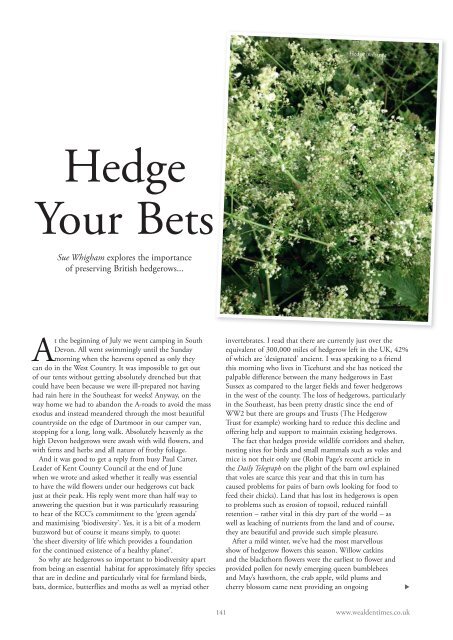Wealden Times | WT163 | September 2015 | Education supplement inside
Wealden Times - The lifestyle magazine for the Weald
Wealden Times - The lifestyle magazine for the Weald
You also want an ePaper? Increase the reach of your titles
YUMPU automatically turns print PDFs into web optimized ePapers that Google loves.
Hedge bedstraw<br />
Hedge<br />
Your Bets<br />
Sue Whigham explores the importance<br />
of preserving British hedgerows...<br />
At the beginning of July we went camping in South<br />
Devon. All went swimmingly until the Sunday<br />
morning when the heavens opened as only they<br />
can do in the West Country. It was impossible to get out<br />
of our tents without getting absolutely drenched but that<br />
could have been because we were ill-prepared not having<br />
had rain here in the Southeast for weeks! Anyway, on the<br />
way home we had to abandon the A-roads to avoid the mass<br />
exodus and instead meandered through the most beautiful<br />
countryside on the edge of Dartmoor in our camper van,<br />
stopping for a long, long walk. Absolutely heavenly as the<br />
high Devon hedgerows were awash with wild flowers, and<br />
with ferns and herbs and all nature of frothy foliage.<br />
And it was good to get a reply from busy Paul Carter,<br />
Leader of Kent County Council at the end of June<br />
when we wrote and asked whether it really was essential<br />
to have the wild flowers under our hedgerows cut back<br />
just at their peak. His reply went more than half way to<br />
answering the question but it was particularly reassuring<br />
to hear of the KCC’s commitment to the ‘green agenda’<br />
and maximising ‘biodiversity’. Yes, it is a bit of a modern<br />
buzzword but of course it means simply, to quote:<br />
‘the sheer diversity of life which provides a foundation<br />
for the continued existence of a healthy planet’.<br />
So why are hedgerows so important to biodiversity apart<br />
from being an essential habitat for approximately fifty species<br />
that are in decline and particularly vital for farmland birds,<br />
bats, dormice, butterflies and moths as well as myriad other<br />
invertebrates. I read that there are currently just over the<br />
equivalent of 300,000 miles of hedgerow left in the UK, 42%<br />
of which are ‘designated’ ancient. I was speaking to a friend<br />
this morning who lives in Ticehurst and she has noticed the<br />
palpable difference between the many hedgerows in East<br />
Sussex as compared to the larger fields and fewer hedgerows<br />
in the west of the county. The loss of hedgerows, particularly<br />
in the Southeast, has been pretty drastic since the end of<br />
WW2 but there are groups and Trusts (The Hedgerow<br />
Trust for example) working hard to reduce this decline and<br />
offering help and support to maintain existing hedgerows.<br />
The fact that hedges provide wildlife corridors and shelter,<br />
nesting sites for birds and small mammals such as voles and<br />
mice is not their only use (Robin Page’s recent article in<br />
the Daily Telegraph on the plight of the barn owl explained<br />
that voles are scarce this year and that this in turn has<br />
caused problems for pairs of barn owls looking for food to<br />
feed their chicks). Land that has lost its hedgerows is open<br />
to problems such as erosion of topsoil, reduced rainfall<br />
retention – rather vital in this dry part of the world – as<br />
well as leaching of nutrients from the land and of course,<br />
they are beautiful and provide such simple pleasure.<br />
After a mild winter, we’ve had the most marvellous<br />
show of hedgerow flowers this season. Willow catkins<br />
and the blackthorn flowers were the earliest to flower and<br />
provided pollen for newly emerging queen bumblebees<br />
and May’s hawthorn, the crab apple, wild plums and<br />
cherry blossom came next providing an ongoing<br />
<br />
141 www.wealdentimes.co.uk


















